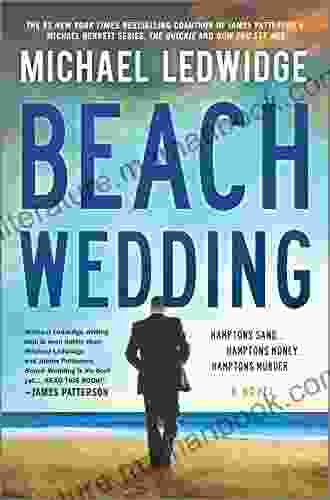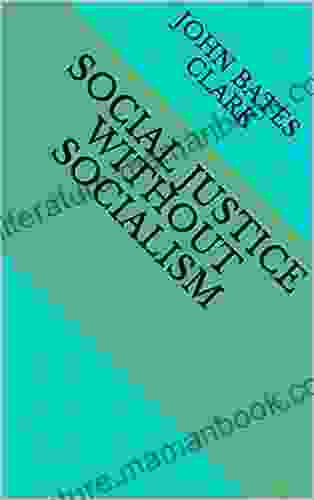Social Justice Without Socialism: The Enduring Legacy of John Bates Clark

In the annals of economic thought, John Bates Clark stands as a towering figure, renowned for his incisive analysis of market forces and his staunch advocacy for social justice. While he vehemently opposed socialism, Clark fervently believed that economic principles could be harnessed to create a more equitable and harmonious society. This article delves into the enduring legacy of Clark's seminal work, exploring his vision of social justice without socialism and its relevance to contemporary economic discourse.
4 out of 5
| Language | : | English |
| File size | : | 5071 KB |
| Text-to-Speech | : | Enabled |
| Enhanced typesetting | : | Enabled |
| Print length | : | 16 pages |
| Lending | : | Enabled |
| Screen Reader | : | Supported |
Clark's Critique of Socialism
Clark was a staunch proponent of free market capitalism, arguing that it fostered competition, efficiency, and economic growth. He believed that socialism, with its centralized planning and public ownership of the means of production, would stifle innovation, diminish productivity, and ultimately lead to economic stagnation. In his seminal work, "The Theory of Distribution," Clark argued that:
"Socialism is not a free gift, but something that must be bought at a great price. It would check the progress of inventions, diminish the efficiency of labor, and destroy the rewards of enterprise."
The Marginal Productivity Theory
Clark's analysis of market forces laid the foundation for his theory of marginal productivity. This theory, which has become a cornerstone of modern economic thought, argues that the value of labor is determined by its marginal contribution to production. In other words, workers are paid what they add to the value of the final product. This theory provided a framework for understanding wage differentials and labor market dynamics.
Social Justice through Competition
While Clark firmly opposed socialism, he believed that social justice could be achieved through the competitive forces of the free market. He argued that competition would weed out inefficient businesses and reward those that offered better products and services. This process, known as "creative destruction," would ultimately lead to a more dynamic and equitable economy. Clark's vision of social justice was based on the notion that:
"Competition is a natural law, and its operation in the economic world produces a distribution of wealth in which the rewards of industry are proportionate to the sacrifices made."
Distribution of Wealth and Income Inequality
Clark recognized that the free market did not always produce a perfect distribution of wealth and income. However, he argued that government interventions aimed at redistributing wealth would only create distortions and stifle economic growth. Instead, he believed that addressing inequality required a multi-faceted approach that included education, job training, and policies that fostered upward mobility.
Clark's Influence on Economic Policy
Clark's ideas had a profound influence on economic policy in the late 19th and early 20th centuries. His marginal productivity theory became a widely accepted framework for understanding wage determination. His emphasis on free market competition as a mechanism for social justice shaped antitrust laws and government regulations. Clark's writings also influenced the development of social welfare programs aimed at mitigating the worst effects of poverty and inequality without resorting to socialism.
Contemporary Relevance
Clark's vision of social justice without socialism remains relevant to contemporary economic discourse. In an era marked by growing economic inequality and technological disruption, his emphasis on free market competition and human capital investment as essential ingredients for economic prosperity and social justice resonates strongly. However, the challenges of creating a more equitable society in the 21st century require a nuanced understanding of the complex interplay between market forces, government policies, and social institutions.
John Bates Clark's unwavering opposition to socialism and his profound faith in the transformative power of market forces have left an enduring legacy on economic thought. His vision of social justice without socialism, predicated on the principles of marginal productivity and free market competition, provides a valuable framework for understanding the complexities of economic distribution and inequality. While his ideas have been subject to debate and modification over time, Clark's belief in the power of human ingenuity and the importance of a fair and equitable society continues to inspire and challenge economists and policymakers alike.
Image Alt Attributes
* John Bates Clark portrait: John Bates Clark, renowned economist and advocate for social justice without socialism. * Marginal productivity graph: Graph illustrating Clark's theory of marginal productivity, which argues that the value of labor is determined by its marginal contribution to production. * Free market competition: Stock photo depicting the competitive nature of the free market, emphasizing Clark's belief in competition as a mechanism for social justice. * Wealth distribution chart: Chart showing the distribution of wealth in an economy, highlighting Clark's recognition that the free market may not always produce a perfect distribution.
4 out of 5
| Language | : | English |
| File size | : | 5071 KB |
| Text-to-Speech | : | Enabled |
| Enhanced typesetting | : | Enabled |
| Print length | : | 16 pages |
| Lending | : | Enabled |
| Screen Reader | : | Supported |
Do you want to contribute by writing guest posts on this blog?
Please contact us and send us a resume of previous articles that you have written.
 Top Book
Top Book Novel
Novel Fiction
Fiction Nonfiction
Nonfiction Literature
Literature Paperback
Paperback Hardcover
Hardcover E-book
E-book Audiobook
Audiobook Bestseller
Bestseller Classic
Classic Mystery
Mystery Thriller
Thriller Romance
Romance Fantasy
Fantasy Science Fiction
Science Fiction Biography
Biography Memoir
Memoir Autobiography
Autobiography Poetry
Poetry Drama
Drama Historical Fiction
Historical Fiction Self-help
Self-help Young Adult
Young Adult Childrens Books
Childrens Books Graphic Novel
Graphic Novel Anthology
Anthology Series
Series Encyclopedia
Encyclopedia Reference
Reference Guidebook
Guidebook Textbook
Textbook Workbook
Workbook Journal
Journal Diary
Diary Manuscript
Manuscript Folio
Folio Pulp Fiction
Pulp Fiction Short Stories
Short Stories Fairy Tales
Fairy Tales Fables
Fables Mythology
Mythology Philosophy
Philosophy Religion
Religion Spirituality
Spirituality Essays
Essays Critique
Critique Commentary
Commentary Glossary
Glossary Bibliography
Bibliography Index
Index Table of Contents
Table of Contents Preface
Preface Introduction
Introduction Foreword
Foreword Afterword
Afterword Appendices
Appendices Annotations
Annotations Footnotes
Footnotes Epilogue
Epilogue Prologue
Prologue Cassie M Shiels
Cassie M Shiels Dion Boucicault
Dion Boucicault Percy Kwong
Percy Kwong Shon Peil
Shon Peil Calle J Brookes
Calle J Brookes Colleen Miller
Colleen Miller C J Hudson
C J Hudson David Weber
David Weber Marie L Thomas
Marie L Thomas Christopher Moore
Christopher Moore Kristen Sutcliffe
Kristen Sutcliffe Tomasz Cichawa
Tomasz Cichawa Nancy Pearl
Nancy Pearl Wladston Ferreira Filho
Wladston Ferreira Filho Jaan Kaplinski
Jaan Kaplinski Gene Mustain
Gene Mustain Claudia Gray
Claudia Gray Mark Stanton
Mark Stanton Frederick Turner
Frederick Turner Stefano Calicchio
Stefano Calicchio
Light bulbAdvertise smarter! Our strategic ad space ensures maximum exposure. Reserve your spot today!

 Cole PowellMichael Ledwidge's Enchanting Beach Wedding Novel: A Journey of Love, Loss,...
Cole PowellMichael Ledwidge's Enchanting Beach Wedding Novel: A Journey of Love, Loss,... Andy HayesFollow ·6.5k
Andy HayesFollow ·6.5k Roy BellFollow ·3.6k
Roy BellFollow ·3.6k Gabriel HayesFollow ·14.4k
Gabriel HayesFollow ·14.4k Earl WilliamsFollow ·13.6k
Earl WilliamsFollow ·13.6k Gerald BellFollow ·19.2k
Gerald BellFollow ·19.2k Lawrence BellFollow ·12.1k
Lawrence BellFollow ·12.1k Asher BellFollow ·8.9k
Asher BellFollow ·8.9k Duane KellyFollow ·7.8k
Duane KellyFollow ·7.8k

 Melvin Blair
Melvin BlairJames Wade's Captivating Tale: Delving into the Second...
In the heart of a realm where the veil...

 Eric Hayes
Eric HayesFabric Paper Thread: 26 Projects to Stitch with Friends
Get ready to embark on a captivating journey...

 Greg Foster
Greg FosterThe Grammy Awards Record of the Year 1958-2024: A...
The Grammy Awards, the most prestigious...

 Alex Foster
Alex FosterSaragarhi: The Forgotten Battle of the British Empire
On September 12,...
4 out of 5
| Language | : | English |
| File size | : | 5071 KB |
| Text-to-Speech | : | Enabled |
| Enhanced typesetting | : | Enabled |
| Print length | : | 16 pages |
| Lending | : | Enabled |
| Screen Reader | : | Supported |














